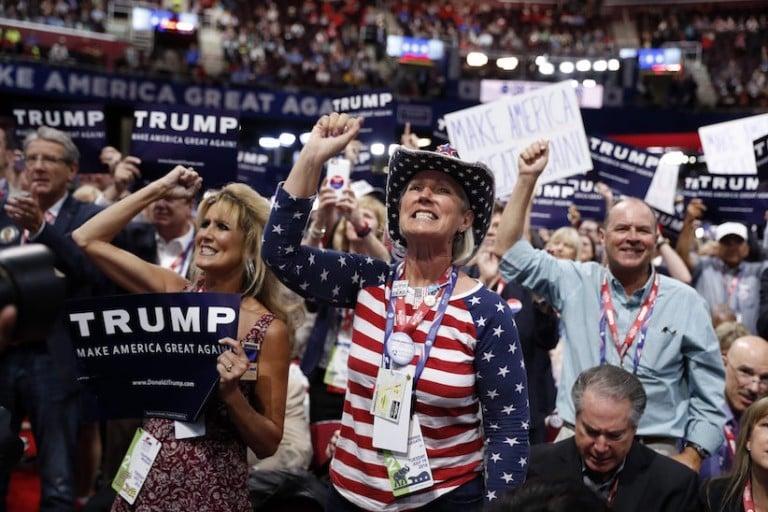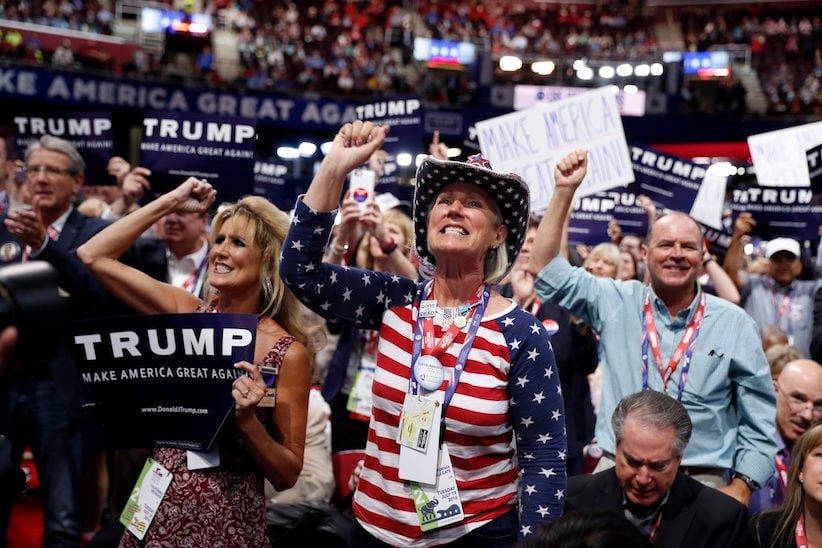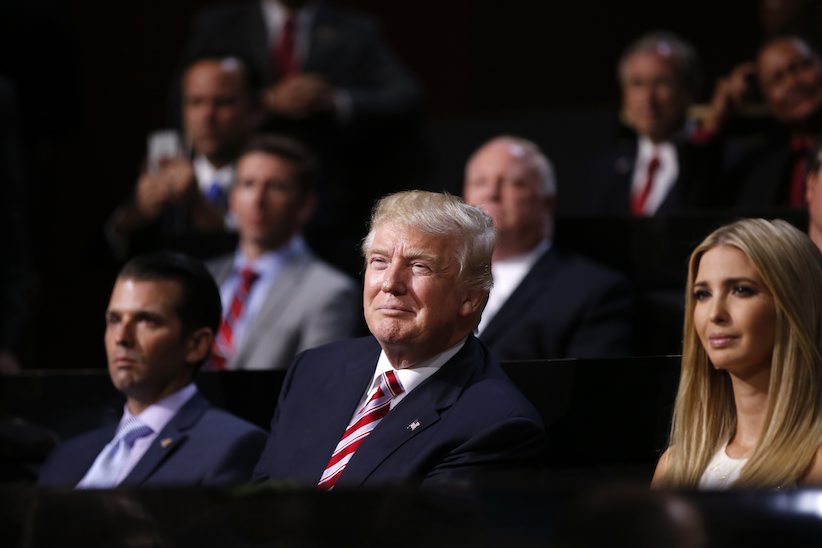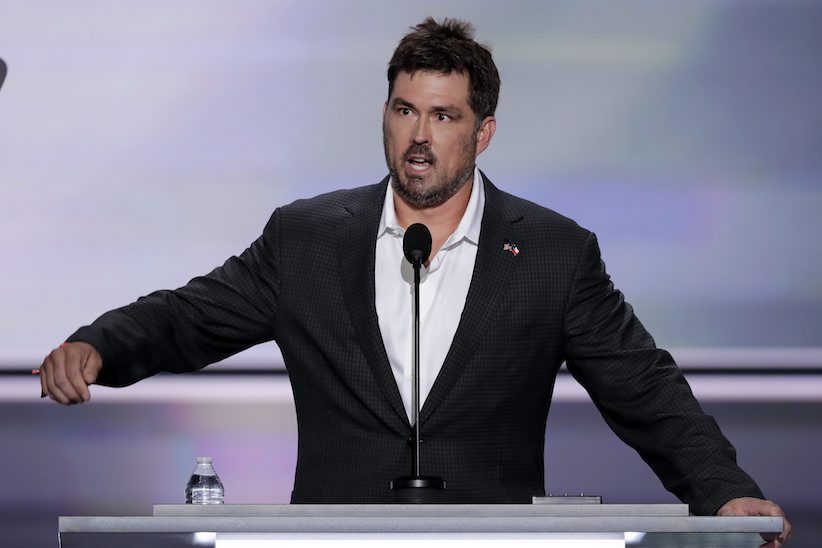Let’s talk about American exceptionalism
The Republican convention has been a festival of Trump-fuelled American exceptionalism. Problem is, he doesn’t believe in it—nor should he.

California delegates react during the second day session of the Republican National Convention in Cleveland, Tuesday, July 19, 2016. (AP Photo/Carolyn Kaster)
Share

You know that thing Americans do when they get all high on patriotism?
An escalating chant of USA! USA! USA! erupts. It’s fun at first, but quickly becomes disconcerting. You side-eye them, and things feel dark real fast, and soon no one’s laughing.
You know what I mean.
The unnerving national self-importance from which this chest-thumping grows has a genuine academic term: American exceptionalism. This is the belief that the United States and its people are inherently special, superior to all other nations, and uniquely endowed with a responsibility to promote liberty, democracy and freedom around the world. It’s a concept closely associated with the American Dream—the conviction that any person can, with determination and elbow grease, move beyond the circumstance of their birth, their family, and their status to realize their greatest potential.
If you’ve been following the Republican National Convention this week, you’ll notice American exceptionalism is alive and well. In fact, according to the rhetoric in Cleveland, it is itself living the American dream—a struggling, hard-working ideology, they say, that’s just trying to get itself back on track and transcend the oppression of an eight-year administration that believes the United States is just another nation.
As conservative radio-host Laura Ingraham gushed: “We never give up. We rise to every challenge. We fight and we win. We’re Americans!”
“Your starting point is not your destiny,” preached House Speaker Paul Ryan just the evening before.
And on Thursday evening, onto the stage will step the embodiment of American exceptionalism: Donald Trump. If we are to believe his disciples, he will return the United States to its God-given path, will never apologize for his nation, and will bring respect back to the greatest country on Earth.
“Today, our allies no longer trust us. Our adversaries no longer fear us, and our enemies are plotting against us […] Donald will never apologize for American greatness. He will promote it,” evangelized Texas Rep. Michael McCaul.
But will he? Donald Trump has said he doesn’t believe in American exceptionalism. In fact, his comment on the topic proves that he may in fact just be disappointed the United States isn’t currently at the top of its game.
In a recent interview with the New York Times, Donald Trump again downplayed exceptionalist sentiment: “I don’t think we have a right to lecture,” he said. But the internal focus doesn’t mean he doesn’t believe America still has special responsibilities to evangelize to the world, just that they need to be set aside momentarily: “We are going to take care of this country first,” he said, “before we worry about everyone else in the world.”
If he truly doesn’t believe in American might and right, however, he might want to let his supporters know. Because they sure think he does.

And they’re brandishing a classic American political idiom to express it. “President Reagan once reminded us that America was a shining city upon a hill. A beacon of hope to the world. But after eight years of weak leadership, our city on a hill is now a city under siege,” warned McCaul on that first evening in Cleveland.
This hill-top city is a beloved Republican metaphor for America, and has been commonly articulated throughout the convention. Likely first uttered by early puritans, but popularized by former president Ronald Reagan, the phrase is lifted from the Sermon on the Mount, and not only places America in a well-defensible location, but grants it divine approval. (Jesus said, “You are the light of the world. A city that is set on a hill cannot be hidden.” And 17th-century early-Americans said, “Yeah, that sounds like us.”)
In truth, Obama himself has used the phrase. Though heavily associated with conservative ideology, exceptionalist rhetoric is not under sole ownership of those who politically lean right. Certain facets of the paradigm are accepted and even championed by liberal Americans.
But at this Republican convention is where we get to see how party members and cheerleaders have translated and bolstered Trump’s slogan: Make America Great Again. And two strong interpretations, dripping in text-book exceptionalism, have emerged. The rallying cry is not only an acknowledgement that America has not lived up to its potential for the last eight years, it is also a proclamation and call to action to make America great again in the world.
This kind of thinking, however, isn’t just innocent cheerleading. One of the convention themes was a call to Make America First Again—and whether this should be interpreted as a need for America to look inward and stabilize its position on that lonesome hill, or an urge to have the country to push to the very front of the line, the ideology fosters extreme thinking.
After all, this view of American exceptionalism can be isolating. Putting America first means putting every other nation last, and being at the top of the hill means being alone. This sentiment inspires blinkered, binary thinking that sets America on its own, detached and embracing of this hyperbole. The convention has only stoked it; on the convention’s opening night, former Navy SEAL Marcus Luttrell cautioned the audience: “The world outside our borders is a dark place. A scary place. America is the light.”

Like a drug, the high of American exceptionalism obfuscates the real light of reality. As believers proclaim blessings on the greatest country on Earth—to go forth and be that inherent world leader—those of us on the outside watch with skepticism. The country has a slew of problems: In the last two weeks alone, there have been 21 mass shootings in the U.S., resulting in 23 deaths. These names are added to a list of over 33,000 gun deaths the country witnesses each year. The country incarcerates its people at the highest rate in the world (note: depending on the type of statistic, sometimes Seychelles comes out on top). The Centre for Research on Globalization claims, “Going to war in Afghanistan is less dangerous than living in Chicago.”
What about the idea that in the land of opportunity anyone can succeed? It may be more myth than reality: A recent analysis of mobility trends concluded that when compared with 24 similar nations, the United States ranks on the lower end, 16th, in intergenerational economic mobility—the impact parents’ income has on the financial success of their children. Canada, Japan, Germany, Spain, France, and even Pakistan are a handful of the countries that compare more favourably.
Consider also the rampant crushing debt (from the federal level to the personal), extreme health care costs (incurring medical debt for over 40 million Americans), and on top of this, income inequality in America has been growing for about 30 years.
If the America we see today is the only promise found in a dark world, it’s less a brilliant radiant light, and more of an unsteady flicker. But America isn’t going to see its true self at all unless it actually looks in the mirror.